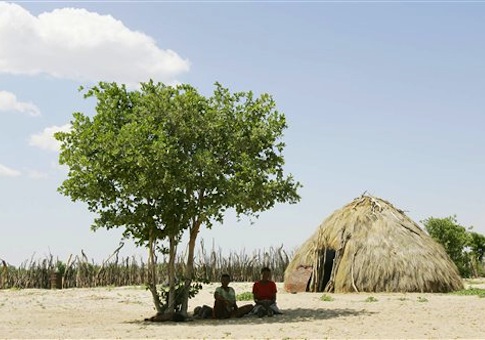Arizona Democratic gubernatorial candidate Fred DuVal was a leading official for a lobbying firm that represented a slew of clients involved in international scandals, including one that revolved around the removal of thousands of indigenous people from their land to clear way for the diamond industry in Botswana.
DuVal joined Hill and Knowlton in 1999 after leaving his position as deputy director of intergovernmental affairs for the Clinton White House. He became the senior managing director of the firm, and remained there until 2002 when he started his own firm.
During the years that DuVal was at the helm of Hill and Knowlton the government of Botswana was a client of the firm.
This period is not a proud one for the southern African nation.
The government removed 1,645 Bushmen, or San, from land that they roamed for a period that is believed to go back 20,000 years. The Botswana government provided an explanatory document explaining why the San were forcibly removed from their homeland, centered around "wishes to integrate the San into the country's social and economic life," according to National Geographic.
More than a decade later, it is becoming increasingly clear that the move did not work. Botswana Bushmen have said "modern life is destroying us."
"I miss my home and the way we lived. Life was easy, there were lots of fruits, animals and there were no bars and no beer. Now we are lost," one San told BBC this year. "We are getting Aids and other diseases we didn't know about; young people are drinking alcohol; young girls are having babies. Everything is wrong here."
They also recollect what was done to them by the Botswana government.
"The police came, destroyed our homes and dumped us in the back of trucks with our belongings and brought us here. They dumped us here like we are nothing," said the San tribesman.
It is widely believed that the San were removed from their land by Botswana to "clear the way for diamond-prospecting companies."
Hill and Knowlton had the Debswana Diamond Company, the Botswana subsidiary of the massive De Beers diamond company, as a client at the same time as Botswana.
"The Government was justified in removing the [Bushmen] from the Reserve. … It is sensible of Government to take such action," said Louis Nchindo, who was managing director of Debwana at the time.
Another Debswana official described Survival International, an organization devoted to protecting tribal people’s lands, as a terrorist group, and worked with the Botswana government to have all of its materials banned from the country.
Another one of Hill and Knowlton’s clients during DuVal’s time there was the American-Arab Anti-Discrimination Committee, which argued at the time that Israel illegally occupied Palestinian lands and this was "the foremost obstacle to peace."
It added that the Israeli military gained those lands when it "invaded the West Bank, Gaza and East Jerusalem."
"These areas of historic Palestine under military control are the ‘occupied territories,’ which are systematically being incorporated into the state of Israel," wrote the ADC. "These illegal policies are in violation of Palestinian national and human rights, as recognized in international law, UN resolutions, and the Geneva Conventions."
The ADC added that the United States "funds the occupation" and is not an "honest broker" in the peace process.
Also a client of the firm while DuVal was there was the Alfa Group, a Russian oil conglomerate involved in varied activities that included launching communications satellites in Iraq, Iran, and Syria.
Alfa was also at the center of the controversial "oil for food" United Nations program that provided 20 million barrels of oil to Saddam Hussein each year. Russia told the United States that the only way it would support toppling the Hussein regime was if the Alfa contract would still be honored after the regime fell.
Alfa was featured in the report by Paul Volcker on the corruption in the oil-for-food program and was suspected of channeling money to Hussein.
The chairman of Alfa’s board was formerly the first deputy head of the Soviet planning commission.
The DuVal campaign did not respond to a request for comment by press time.
